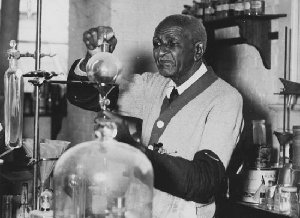Greetings Scientists!
George Washington Carver was an American scientist, scholar, and farmer. He was born a slave in Missouri in the 1860's. His actual birth date is unknown.
He attended as much school and college as he could and became a scientist - especially interested in farming, research, and growing food.He noticed that Southern farmers grew the same crops year after year in the same fields and that the soil became "tired" or depleted after heavy use.
He tested and developed science experiments to improve the soil!
GWC developed many methods of crop rotation and discovered that the use of certain plants helped rebuild and make soil healthier.
*In our garden, we use these methods today!
*We plant cover crops in the Winter to add nitrogen back into the soil:
*We rotate what types of plants we grow.*By adding plants such as fava beans and other legumes (peanuts, peas, sweet potatoes), we make the soil stronger from year to year.
George Washington Carver is famous for his work with peanut plants!He also encouraged poor people to grow their own food to help with their own economic independence.
Activity: Think of a problem in our garden or a question you have about plants.*Design a science experiment to test out a solution!
Student Questions 2/25/21:
- Do green grapes turn into purple raisins?
- What's the heaviest rock?
- If you drop water on a leaf, will it splash off, bend the leaf, or stay in place?
- Can you see air coming out of leaves?
- Can we change a flower into a different color?









